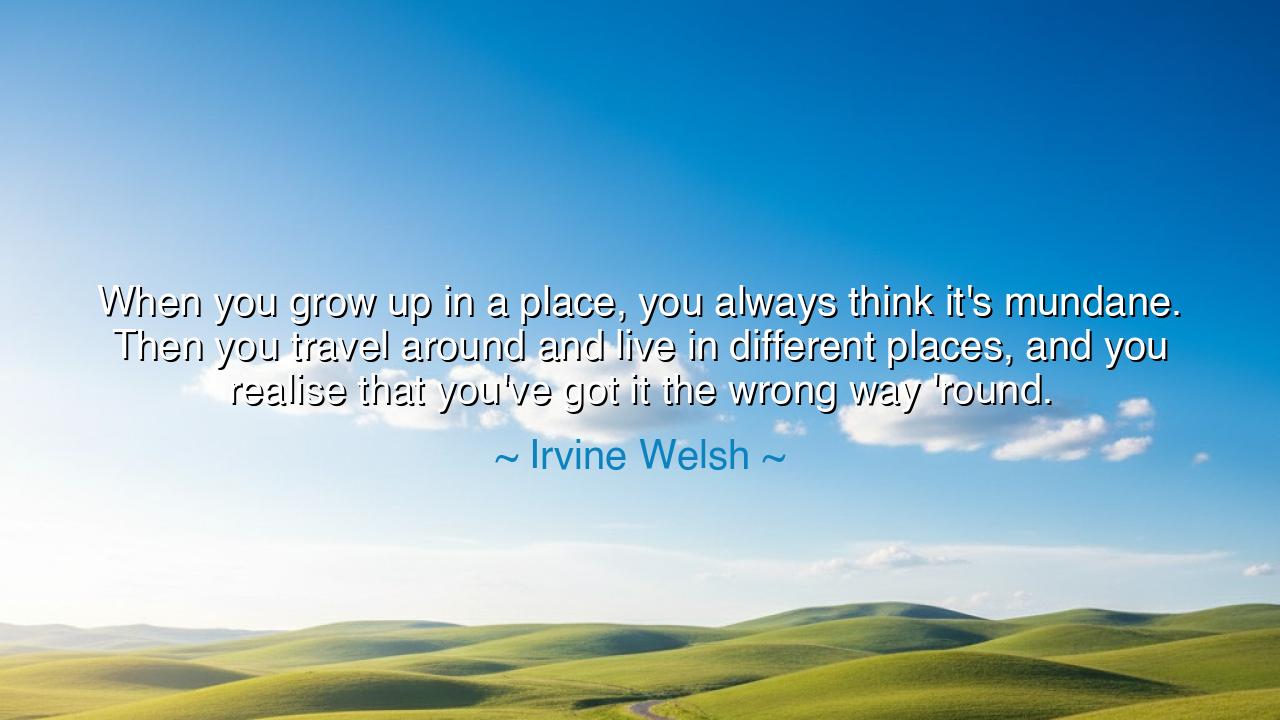
When you grow up in a place, you always think it's mundane. Then
When you grow up in a place, you always think it's mundane. Then you travel around and live in different places, and you realise that you've got it the wrong way 'round.






Hear, O traveler, the words of Irvine Welsh, who wrote of the hidden treasure of one’s birthplace: “When you grow up in a place, you always think it’s mundane. Then you travel around and live in different places, and you realise that you’ve got it the wrong way ’round.” These words are more than reflection—they are revelation. For they speak to the blindness of familiarity, the way in which daily sight dulls the soul, and how only through departure can one truly learn to see.
The essence of his saying is that familiarity breeds blindness. When we are children in our towns, villages, or cities, the streets seem ordinary, the houses unremarkable, the landscapes unworthy of wonder. We mistake the everyday for emptiness. Yet Welsh reminds us that this is an illusion, a trick of the spirit dulled by repetition. Only when we wander afar, when we measure our own soil against foreign ground, do we awaken to the richness of what we left behind.
This truth was known to the ancients. Consider Ulysses (Odysseus), who roamed the seas for twenty years, facing storms, monsters, and the temptations of foreign lands. Yet in the end, what did he desire above all? To return to Ithaca, his rocky, modest homeland. To others, Ithaca was a poor island; to him, it was the heart of life itself. Welsh’s words echo this same wisdom: that only by leaving do we come to cherish home, and only by traveling do we see that what once seemed mundane is in truth extraordinary.
In our own age, we may think of the immigrant who leaves the village for the city, or the student who leaves their homeland for study abroad. At first, the familiar place feels small, constraining, even dull. Yet in the strangeness of the new, they realize the depth of what they carried from home: the taste of a mother’s cooking, the rhythm of local songs, the stories told in the marketplace. What was once taken for granted now glows with sacred value. This is the paradox of travel: it teaches us not only about the world, but about the treasure of our own beginnings.
Welsh’s words also warn against the arrogance of restlessness. Many chase endlessly after novelty, despising their roots, convinced that the extraordinary lies always elsewhere. Yet true wisdom is balance: to travel, yes, to see, yes, but also to return with new eyes and honor the soil that first shaped you. To despise one’s homeland is folly; to cherish it blindly without knowledge of the world is ignorance. The wise walk both paths, and so find the truth.
History gives us an example in Marcus Aurelius, the Roman emperor-philosopher. He ruled an empire vast and filled with wonders, yet in his Meditations, he wrote often of the simplicity of home, of the discipline and wisdom he inherited from his family. Though he held the world in his grasp, he honored the ordinary virtues of his beginnings. This is Welsh’s teaching: that the “mundane” is never mundane, if only we have eyes to see.
The lesson, then, is this: do not despise the familiar. If your birthplace feels ordinary, travel. Wander, see the world, and then return. You will find that the common streets you once scorned shine with hidden glory. In practice, take time to learn the stories of your land, to walk its paths with fresh attention, to see with the eyes of a traveler even when you are at home. Let travel teach you to value, not to escape.
Thus, Welsh’s words endure as a compass for the restless soul: the world is vast, but so too is the depth of the soil beneath your own feet. What you thought dull may in truth be sacred, and what you thought small may in truth be immense. Travel, then, not to abandon your beginnings, but to see them anew, and to discover that the ordinary was extraordinary all along.






AAdministratorAdministrator
Welcome, honored guests. Please leave a comment, we will respond soon